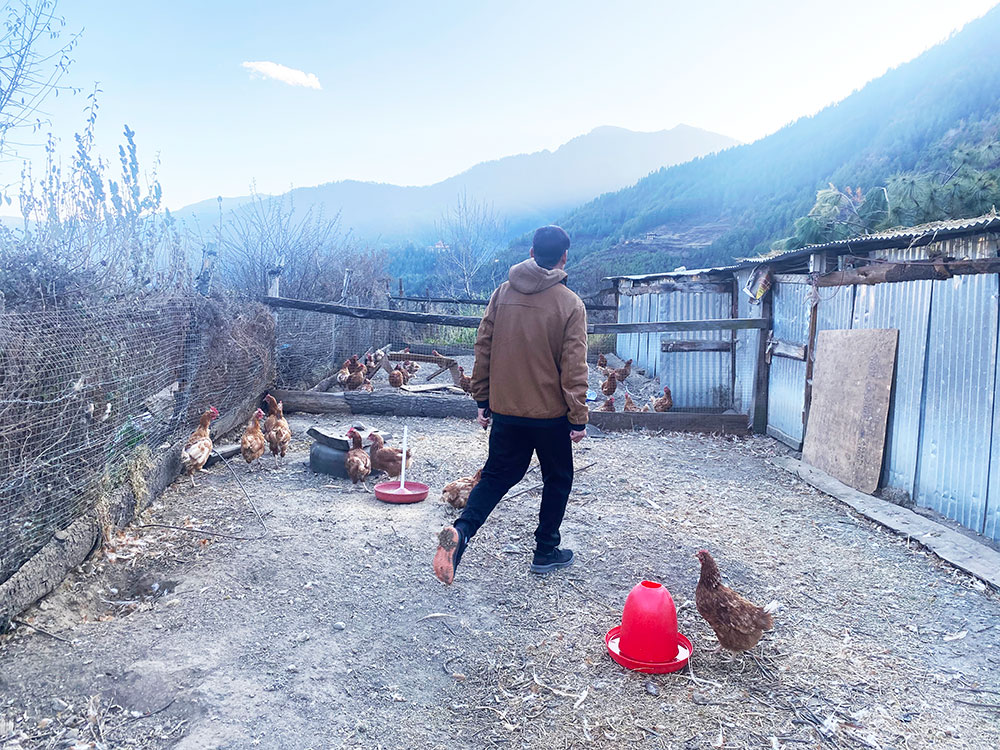…if situation deteriorates
Phub Dem | Paro
After Sarpang, it is now poultry farmers in Haa and Paro who are complaining of a drastic reduction in egg production and dying birds.
Around 5,000 poultry birds have died in the two dzongkhags and farmers are suspecting the same problem: contamination in the feed supplied by Karma Feeds. Many poultry owners reported not seeing a single egg laid after being fed with Karma Feed’s November 24th batch feed.
According to farmers, birds in Paro started dying in large numbers and those alive have stopped laying eggs. Even after replacing the feeds, the birds were still dying and there were no eggs.
Poultry farmers in Paro are demanding compensation if all their birds die.
Damchoe Tshering, a poultry farmer from Tsento, said there was no talk of compensating the losses except for replacing the feed. He said that he did not even get the replacement after signing an undertaking letter some days ago.
A group of poultry farmers from Tsento held Karma Feed responsible and said that the company should compensate farmers, although they do not expect 100 percent compensation.
Damchoe Tshering said that the members suggested that the Karma Feed provide free feeds until their layers start laying eggs and provide chick replacement.
“It takes around five months to raise chicks into layers, but we are willing to do it if they consider our proposal.”
He said that there was no response from the company (Karma Feeds) except for feed replacement. “We told the feed agent that we won’t be able to pay the credit for the feeds as the income is zero.”
Another farmer said they were unsure if the birds could survive and lay eggs.
Records with the Paro dzongkhag agriculture office reveal that of the 83 poultry farms in the dzongkhag, 39 poultry farms that used Karma Feeds were affected. As of yesterday, Paro reported the death of 2,900 pullets and 1,625 layers.
Dzongkhag livestock officer Tshegay Norbu said that except for a few poultry farms, there was no egg production in Paro.
He said that some farmers were switching to other imported feed, but that was found ineffective as the feeds from Karma Feeds could have already affected the digestive and reproductive health of the birds. “We are concerned about the birds that are losing their feathers and not laying eggs.”
Meanwhile, in Haa, eight of 22 poultry farms were affected. The affected farms reported zero egg production and a few birds dying. The livestock production officer of Haa, Kipchu, said that other farms remained unaffected as they used other imported feeds. He said some farms observed a few eggs after the feeds were replaced.
Records with officials show that out of the total 9,500 affected birds in eight farms, 127 birds died.
Damchoe Tshering from Tsento gewog in Paro said he lost around 206 starters, and that about three birds die on an average daily. He said he had 2,000 birds and there was no egg production. “Layer birds are all losing feathers and it is hard to tell if the birds will survive. They hardly eat.”
He said that since December 6 there has been no egg production. Usually, Damchoe Tshering collects six cartons daily, earning Nu 18,000. In a month, he fetches Nu 540,000. He said that while the income remained zero, he had to change the feeds, pay monthly leases, a loan, and electricity bills. “We are at a loss. This is our only source of income.”
Another farmer, Ramesh Rai from Dopshari, said that birds are dying every day. He claimed about a 40 percent reduction in egg production. Ramesh Rai said his farm was not affected as he used feeds produced after November 22. However, he said that after using the feeds from the December 9 batch, his birds were affected.
Nirmal Tamang from Lamgong said his 500 birds laid no eggs in the past few days. Although mortality is less, he said that birds were losing feathers and it was challenging to care for them, especially during the cold season.


